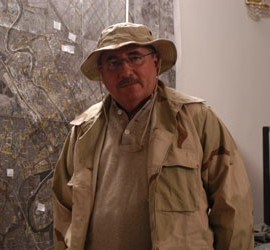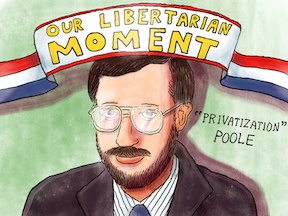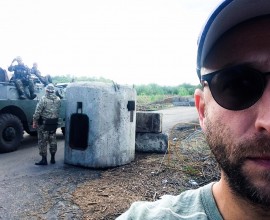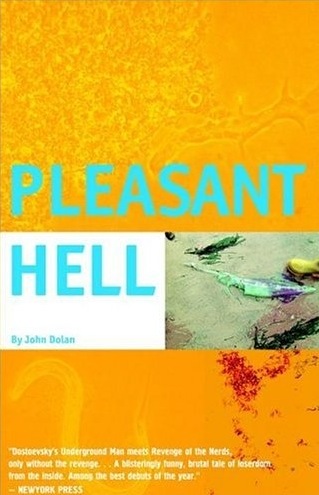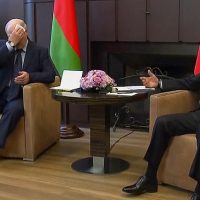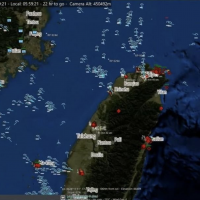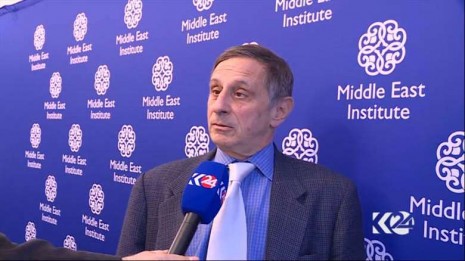
This a response to neocon interventionist Roy Gutman’s two-part hit job smearing the leftist Kurdish resistance in Syria, published in The Nation in February (here and here). Since Gutman’s article was published, his own sources accused Gutman of fabricating their quotes and inventing things that never took place. In one case, Syria expert Fabrice Balanche, took to twitter to call out Gutman for fabricating his quote on why 500,000 Kurds fled northern Syria — Balanche says they fled for economic reasons and due to wars, not because they fled the allegedly repressive rule of the leftist YPG:
Gutman’s misquote:
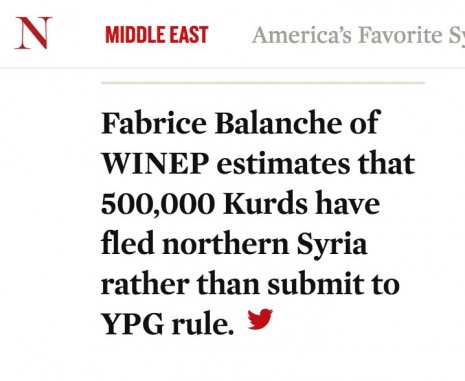

Balanche responded on Twitter:
1/2 False quote: Fabrice Balanche estimates that 500,000 Kurds have fled northern Syria rather than submit to #YPG .https://t.co/7OS6WHpoW2
— Balanche (@FabriceBalanche) February 21, 2017
@joshua_landis @Pyrmha108 @thenation yes, most of the 500,000 left for economic problems not political. Gutman's sentence is false
— Balanche (@FabriceBalanche) February 14, 2017
Finally, Gutman was forced to retract the quote. But even in something this simple and straight-forward Gutman had a hard time being honest, explaining his fabricated quote as having been “inaccurately compressed”:
I quoted Fabrice Balanche correctly on the numbers who fled, but I inaccurately compressed his estimate into the same sentence as my broader observation. I acknowledge Balanche’s view that most of the refugees fled for economic reasons.
Balanche wasn’t the only one who called out Gutman for fabricating quotes or events.
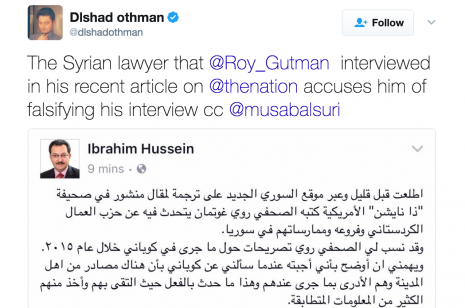
John Dolan—aka The War Nerd “Gary Brecher” — sent out a special Radio War Nerd subscriber newsletter to respond to Gutman’s hit pieces. He asked to repost it on eXiled Online, open and free to everyone, so that Gutman can’t escape it and everyone who cares knows Roy Gutman’s sleazy game.
I’ve responded to the article in several Facebook posts, but this is important enough to deserve a more formal response. So here it is.
Gutman’s article is a shoddy, dishonest mess, but it will be effective, because the Nation has a better rep than the author’s usual venue, The Daily Beast. So Gutman’s smear will stick, eroding support for the YPG/J, the one heroic faction in the miserable Syrian War.
Gutman didn’t get a six-month grant to write this just for fun. He’s a serious journalistic hit-man.
When Roy Gutman starts writing attack stories, attack aircraft soon follow.
Of course there have been plenty of hit-pieces on the YPG/J before. (I’ll use “YPG/J” for simplicity here, though the YPG/J is now part of a new alliance called “Syrian Democratic Forces,” or “SDF.”)
Some of these marginal reactions were hilarious, as when American right-wingers, infatuated by photos of the women of the YPJ carrying heavy weapons, volunteered — only to discover that they’d joined up with a bunch of socialists who fought under the red flag.
And among those who fly the red flag themselves, there were the inevitable quibbles — mostly by leaders of “movements” with a two-digit membership, seething with rage at this upstart Kurdish militia for being big, successful, and popular. This sort of noise is inevitable. War is a nasty business, and often the combat isn’t the nastiest part.
Luckily for the YPG/J, the more sinister elements of the big media were, until now, too busy coming up with stories about atrocities committed by “The Regime” (the Assad government) and its Shia allies to deal with the Syrian Kurds. If you’ve read any Syria stories in The Daily Beast, you’ve seen this kind of atrocity-on-demand reporting, usually bearing the tell-tale byline “Michael Weiss.”
Weiss & co. led the way with reports on the atrocities committed during the “fall” of Aleppo to the Syrian government. If you recall, there were mass rapes,civilians shot on sight, and 250,000 civilians in Eastern Aleppo who would inevitably be slaughtered by “The Regime.”
Except it turned out none of that was true. It was fake news.
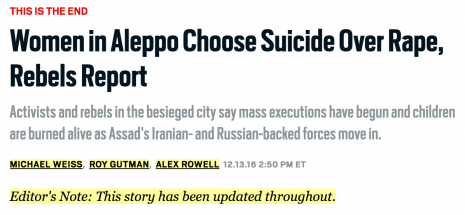
There were not hundreds of thousands of civilians in East Aleppo in the first place, largely because the rule of the chaotic, factionalized jihadi militias was so inept that almost all residents got out as soon as they could. Children were not burned alive. There were no mass rapes. It was all lies, produced by journalists nowhere near Aleppo, swallowing and amplifying the sort of hysterical rumor that inevitably accompanies a big defeat and deploying it for the purposes of their patrons: the deep states of Turkey, Saudi Arabia, Israel, and above all the United States — all of whom want regime change in Syria at all costs.
Aleppo “fell”; the stories stopped; no burned children’s bodies were discovered, no mass graves were found other than the ones in which Weiss’s (and RoyGutman‘s) “hero jihadis” buried the prisoners they killed. And of course, apologies were not forthcoming. Weiss & co. are not the sort of people to waste time in vain regret, they moved on to the next front in the propaganda war: slandering the YPG/J. The Turkish state was getting more worried about the Syrian Kurds than “The Regime.” Assad’s Alawites are no threat to Turkey, but the YPG/J, with its strong links to the Turkish-Kurdish PKK militia, could become a real problem.
Enter Roy Gutman. He was doing Weiss’s kind of journalism while Weiss was still checking out Barney for possible war crimes. Gutman won the Pulitzer Prize in 1993 for a series of stories on Serbian “atrocities.” Interestingly, both of the 1993 winners of the “International Reporting” Pulitzer won for stories on Serb “atrocities” that turned out to be, at the very least, exaggerated:
“International Reporting:
Roy Gutman of Newsday, Long Island, NY
For his courageous and persistent reporting that disclosed atrocities and other human rights violations in Croatia and Bosnia-Herzegovina.”
The stories paid off in the US-led air war against Serbia in 1999 — in that sense they were very successful. They were not, however, especially accurate. The New York Times’ Balkan correspondent, David Binder, wrote that,
“…Gutman’s stories [on the Balkan War], far from representing on-the-scene reporting, were based on scantily identified sources who never surfaced as real people” and that one of Gutman’s key sources “turned out to be using five different aliases.”
Binder sums up Gutman’s work with Orwell’s phrase “Once a whore, always a whore.” So naturally The Daily Beast thus found Gutman the perfect co-author for Weiss for its endless flow of hit-pieces on Syria. When the Beast told its readers that the Syrian Army was committing mass rapes in Aleppo, Gutman and Weiss shared the byline.
When the Turkish state wanted the Kurds softened up in advance of an attack on Rojava (the de facto Kurdish state in Northern Syria), it turned to Gutman, now based in Istanbul.
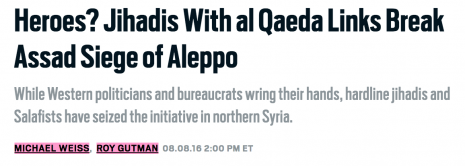
And Gutman came through in his classic style. Let’s have a look at what he managed to do with his assignment: maligning the YPG/J for The Nation.
The first part has a real grabber of a title, using the time-honored ask-a-question method: “Have the Syrian Kurds Committed War Crimes?”
Gutman concludes, inevitably, that indeed they have. Never mind which crimes; most people will simply pass the headline around on social media. You know how it works. I know, everybody knows: somebody sends you the headline, you get the point, you don’t bother reading the story. So, thanks to Gutman and the editors at The Nation, thousands of naive Twitter and Facebook users will draw the easy, lazy conclusion that the Syrian Kurds are just as dirty as Islamic State, Jabhat Fateh-ash-Sham, or any of the other factions in the Syrian war. They’re all the same, right?
Wrong. If you actually get past Gutman’s headline, his evidence for “war crimes” committed by the Syrian Kurds is remarkably feeble. Given what might be called the ambient level of horror in this war, what’s striking is Gutman can’t even accuse the Kurds of the sort of crimes that have become commonplace among other militias. Have they slaughtered civilians for speaking the wrong language? No. Have they said, as the leaders of most of the Sunni militias have done, that everyone must accept their creed, leave, or die? No.
Gutman’s main claim is that the YPG/J has expelled villagers from their houses and even demolished or burned those houses. That’s possible, though people I know who are serving with the YPG/J deny it. And in the Syrian context, where massacre videos have become old news, mere expulsion and property damage hardly register as “war crimes” at all.
Let’s suppose that, for once, Gutman’s sources are telling the truth. Why would the Kurdish militia expel people or burn their houses? Irregular war is not Gettysburg. When an irregular force occupies a village or town dominated by hostile factions, it has limited options. Faced by harassment sniping or collusion with the former rulers among inhabitants, the irregular force can, and usually does, simply kill those it suspects. The YPG/J doesn’t do that, as even Gutmanimplicitly admits.
So, faced with implacable ethnic or sectarian enmity — in practice, refusal to accept “atheist” YPG/J occupation among devout Sunni Arabs — the Kurds may (or may not) have expelled suspects from occupied villages. That may not be Geneva Rules, but by the standards of irregular war, let alone the standards of Syria over the last four years, it’s the mildest reaction possible.
Gutman also claims that the YPG/J has colluded with the Assad regime to divide up parts of the country, notably Hasakah. Very possible. Again, standard multi-faction war behavior. And very sensible, too, since until recently there was a little problem in that part of Syria called Islamic State that called for collusion, a damned sight more collusion than actually occurred.
Gutman implies that this collusion proves that the YPG/J is a creature of the Assad regime. This is nonsense. The guy needs to watch Game of Thrones, even if he can’t do any more serious historical research in the pattern of endless treachery which defines these wars. Actually, Assad’s “Regime” hates the YPG/J. Assad’s defenders on social media never fail to sneer at the YPG/J’s good reputation, and call people like me “Rojava-heads” while vowing to reconquer every inch of Syria. That vow is addressed to Syria’s Kurds, and is an existential threat (as they say) to Rojava. Any collusion between Assad and the YPG/J was a classic alliance of convenience, as local observers have always realized.
Gutman‘s claims all depend on pretending that irregular war is inherently evil, that there are no rules governing unconventional war. If the YPG/J’s tactics are illegitimate, you’re delegitimizing all irregular war. You’re describing tactics practiced by every irregular leader from Collins to Mandela. You have not found evidence of actions that are considered atrocities by legitimate irregular groups: enslavement, sectarian murder, forced conversion, massacre of prisoners.
That last one, “massacre of prisoners,” is the most significant. If you know irregular war, you know that groups can’t afford to keep POWs in nice neat camps. So most of the time, they try to trade them, or kill them outright. Killing of prisoners has been documented among many groups in the Syrian War.
There’s no evidence, no claim even by Gutman that it’s been carried out by the YPG/J.
To decry the tactics of irregular militias by way of advocating high-tech bombing campaigns is Gutman’s standard MO. It’s also a particularly vile, though lucrative, form of hypocrisy.
Oddly, Gutman takes on the YPG/J’s greatest moment, Kobane — a purely conventional battle where no civilians were involved and where the Syrian Kurdish militia behaved heroically.
But look what that struggle becomes in his hands:
“In late 2014, when ISIS attacked Kobani, drawing US air strikes that killed as many as 2,000 ISIS fighters….[a]ccording to former residents, the YPG abandoned the outskirts of Kobani to ISIS without a fight, ordering residents to leave the villages they were eager to defend.”
Even by Gutman‘s very low standards, this is appalling. He accuses the YPG/J of abandoning outlying villages — a “war crime”, apparently.
Remember the siege of Kobane? Remember the situation in Syria in the winter of 2014-15?
IS was advancing on the little Kurdish border town of Kobane with a huge force, complete with all the heavy weaponry it had inherited from the collapse of the US-funded Iraqi Army. YPG/J was holding out — outnumbered, outgunned by IS, which was coming off a string of remarkable victories and considered unstoppable. After all, the much bigger, better-armed Iraqi Army had just abandoned half of Iraq to a few hundred IS troops.
And now they were closing in on Kobane. Erdogan, whose spies were helping IS, gloated in October 2014 that “Kobane is about to fall.” No one doubted him.
As the huge IS force closed in on the town, YPG/J commanders withdrew to the city, and ordered locals to pull back with them. They told civilians to flee across the border, but they themselves set up defensive positions in the town and prepared to die fighting.
They did die, in huge numbers. Estimates vary, but at least 2,000 women and men of the YPG/J were killed in that battle. But they held on. They held Kobane against that formerly unstoppable IS force, and with US air support killed thousands of those slave-dealing sectarian IS fighters. IS was never the same “unstoppable” force after its defeat in Kobane. (And Turkey began to be concerned about this annoyingly undefeated Kurdish militia on its southern border which had failed to collapse on schedule.)
A great moment, one of the few truly heroic moments in our era. But not for Roy Gutman. Hey, that’s not his assignment. Gutman dismisses the Siege of Kobane with a single paragraph implying that ordering an outnumbered defending force to pull back into a central urban position, against the wishes of “former residents” of those “outlying villages,” is in some way blameworthy. Withdrawing to a central, defensible position is the obvious tactic for an outnumbered defensive force. Oh, and in passing he slanders the thousands of Syrian Kurds killed in the battle with the outright lie that it was the “US air strikes” alone that killed IS attackers, as if the defenders of Kobane somehow failed to inflict a single casualty on IS in the entire long siege.
Credible Kobani emigres claim it was all staged. But they cdnt prove it. This needs a careful day-by-day study ldg up to battle of Kobani https://t.co/p3wu09rAXF
— Roy Gutman (@Roy_Gutman) February 10, 2017
Gutman’s lack of conscience actually frightens me a little. You’d think he’d avoid talking about the Syrian Kurds’ most heroic moments, like Kobane. Au contraire! In the second part of his Nation piece, snidely titled “America’s Favorite Syrian Militia Rules with an Iron Fist,” he takes on another of the Syrian Kurds’ most heroic actions, the liberation of Sinjar.
Again, it helps if you actually know a little about the context, because Gutman and his editors are hoping you don’t. Sinjar is a town in northwestern Iraq inhabited mostly by the Yezidi, a minority religious sect. IS overran the area in the Summer of 2014. The people of Sinjar were expecting to be protected by the peshmerga militia of the KRG (Kurdistan Regional Government) of northern Iraq. For reasons still not clear, the peshmerga fled and left the Yezidi defenseless (rumor has it that this involves PUK/KDP rivalry within the KRG.)
Islamic State zoomed into Sinjar unopposed. And then, because the Yezidi were “kaffir,” “unbelievers,” Islamic State murdered thousands of civilians, saving only young women. They kept the young Yezidi women and girls alive so they could be sold as sex slaves. Even now, Yezidi women are sold as sex slaves. This is not a wild rumor, unlike Gutman’s tales. Islamic State not only admits the massacre and enslavement, they boasted about it in an article, “The Revival of Slavery before the Hour,” in their glossy magazine, Dabiq.
The fall of Sinjar was one of the worst war crimes — real war crimes — in recent history. And it remained unavenged until the Syrian and Turkish Kurds of the YPG/J and PKK freed the area.
Now, let’s have a look at that horrific story as reported for The Nation by Roy Gutman:
“Turkey is not the only US ally at odds with the YPG. Iraq’s Kurdistan Regional Government in late December threatened to use force if the PKK didn’t withdraw from Sinjar in northern Iraq, which the KRG insists is in its security sphere. (The PKK had moved into Sinjar in 2014 to fight off an ISIS attack against the Yazidi population there.)”
Did you catch that? For Gutman, the liberation of the Yezidi survivors proves only one thing: The YPG and PKK are troublemakers, unpopular not only with Turkey but the KRG which had abandoned the Yezidi to their fate. He gives one sentence—in parentheses, yet! — to the cause which brought these interlopers to Iraq: “..to fight off an ISIS attack against the Yazidi population there.” Yes, Roy, there was a bit of an attack. A bit of a genocide, in fact, but never mind — it’s not going to help your case, so never mind.
You can see Gutman’s core agenda in this disgusting passage. Gutman’s patron is the Turkish state, and its quarrel with the YPG/J is that it’s too closely associated with the Turkish-Kurdish militia, the PKK. The Turkish military/intelligence state fears that a de facto Kurdish state in Rojava will serve as a cross-border sanctuary for PKK fighters within Turkey.
Months before Gutman’s Nation article appeared, Erdogan’s favorite newspaper, The Daily Sabah — the Fox News of Turkey — published an article accusing the YPG/J of being a tool of the PKK. It would have made (may have made, for that matter) an excellent first draft for Gutman’s piece.
So, if the PKK rather than the YPG/J itself is the real villain of Gutman’s piece, what can we say about the PKK? Gutman makes three points about them:
1. The PKK is listed by some countries as a terrorist group.
2. The PKK is funded by Iran.
3. The PKK and YPG/J are really the same organization.
The third claim, that the YPG/J and PKK are basically the same group, is roughly true. “Roughly” because the history of insurgent groups is full of factional splits among groups that were once united. For the moment, at least, it seems that the YPG/J and PKK share leadership.
And the proper response to this is, “So what?” Which brings us to the big question, the one that Gutmanwill never ask: Why is there a PKK in the first place?Why are Turkey’s Kurds, who make up about a quarter of the country’s population, so angry that they’re willing to undergo the horrors of irregular war against a powerful, ruthless security state, in order to win autonomy?
The treatment of Turkey’s Kurds is an appalling story. Modern Turkey was founded as a mono-ethnic state. Everyone inside it was a Turk. Those who were not (Greeks, Armenians) were killed or expelled. Those remaining inside its borders were Turks — by law:
“A 1924 mandate forbade Kurdish schools, organizations and publications. Even the words ‘Kurd’ and ‘Kurdistan’ were outlawed, making any written or spoken acknowledgement of their existence illegal…[B]etween 1925 and 1939, 1.5 million Kurds, a third of the population, were deported and massacred.
“In 1930 the Turkish Minister of Justice declared, ‘I won’t hide my feelings. The Turk is the only lord, the only master of this country. Those who are not of pure Turkish origin will have only one right in Turkey: the right to be servants and slaves.'”
The Turkish state’s hatred for Kurds has been a constant of modern Turkish history. I’ve talked to ethnic Turks who grew up in the Southeast, watching Kurdish kids’ bodies dragged behind M113s. This mistreatment intensified when a Kurdish-oriented political party, HDP, played a role in Erdogan’s only election setback in 2015.
Since that loss, Erdogan’s AKP party has unleashed the state security apparatus on anyone connected with the HDP or any other Kurdish-oriented politics. The co-mayors of Diyarbakir, the biggest Kurdish city in Turkey, have both been arrested, as have thousands of Turkish Kurds suspected of any link to Kurdish activism. So the next time somebody tells you the PKK “engages in violence, why don’t they try peaceful political means?” — ask them to tell you how many peaceful HDP activists are now in Turkish prisons, where torture is SOP.
Remember, Gutman is a journalist based in Istanbul. He must be familiar with this information. It’s not exactly obscure. But you won’t hear about any reasons for Kurdish discontent in Turkey in his PKK-bashing.
As for Gutman’s second point, the PKK’s “terrorist group” designation — it depends on who you ask. The PKK is an irregular militia, or “guerrilla” organization (which for Gutman means it’s automatically in the wrong, since he fails to recognize any rules operating in irregular war) — but the PKK is actually rigorous in trying to avoid random civilian casualties. This can be demonstrated very simply if you go through the record of bombing attacks in Turkish cities. When they target random civilians, even Turkish authorities know they can safely be attributed to Islamist militias. When they are aimed at Turkish police or soldiers, they are inevitably the work of the PKK.
So which countries say the PKK is a “terrorist” group? Turkey, as you might expect. And NATO, because Turkey is a huge part of NATO’s military power. And the US, which has nuclear weapons stored on Turkish bases. All of which proves nothing. Other groups not dependent on Turkish military support refused to classify the PKK as a terrorist group. The UN does not consider it “terrorist.”
Even the tame US media gets a little confused about why the PKK must be called a terrorist group, as in the Washington Post’s headline: “A US-Designated Terrorist Group Is Saving Yazidis and Battling Islamic State” — one of those headlines that seem to have in implied “WTF!?” in invisible ink at the end.
As for Gutman’s claim that the PKK is funded by Iran, it’s impossible to verify or refute with any certainty. If you were running the Iranian state, you might have an interest in funding insurgent groups which could be employed against troublesome neighboring states (and then betrayed to their security forces when relations improved). That sort of Byzantine treachery has been the Kurds’ fate for decades, and no doubt Iran is playing some murky role in the process even now. But again — so what? Why is “Iranian involvement” somehow prima facie evidence of innate evil, when blatant interference in Middle Eastern wars by other states — the US, Saudi Arabia, Turkey, Israel, Qatar, Britain — is taken as natural or even beneficent? Iran is a regional power with its own Kurdish population (which it generally treats better than Turkey has treated its Kurds); as such, it may dabble in Kurdish insurgency. One good way for Turkey to stop that would be to end the reason for the PKK insurgency in the first place: by ending the Turkish state’s monstrous oppression of its Kurdish population.
In short, Gutman’s two-part article is a shockingly dishonest, sleazy and incompetent performance. I wouldn’t have been surprised to see it in the pages of The Daily Beast; they have made it very clear they have no standards in reporting on Syria. The surprise is that it appeared in the pages of The Nation. You expect a little more out of them.
Or at least I did. My mistake. Turns out that some editors there have the same dreary Manhattan-Leftist envy and hatred for a victorious, non-sectarian socialist militia as every other dismal basement Trotsky.
John Dolan (aka “Gary Brecher”) co-hosts the Radio War Nerd podcast with Mark Ames. Subscribe today!
March 10th, 2017 | Comments (8)




